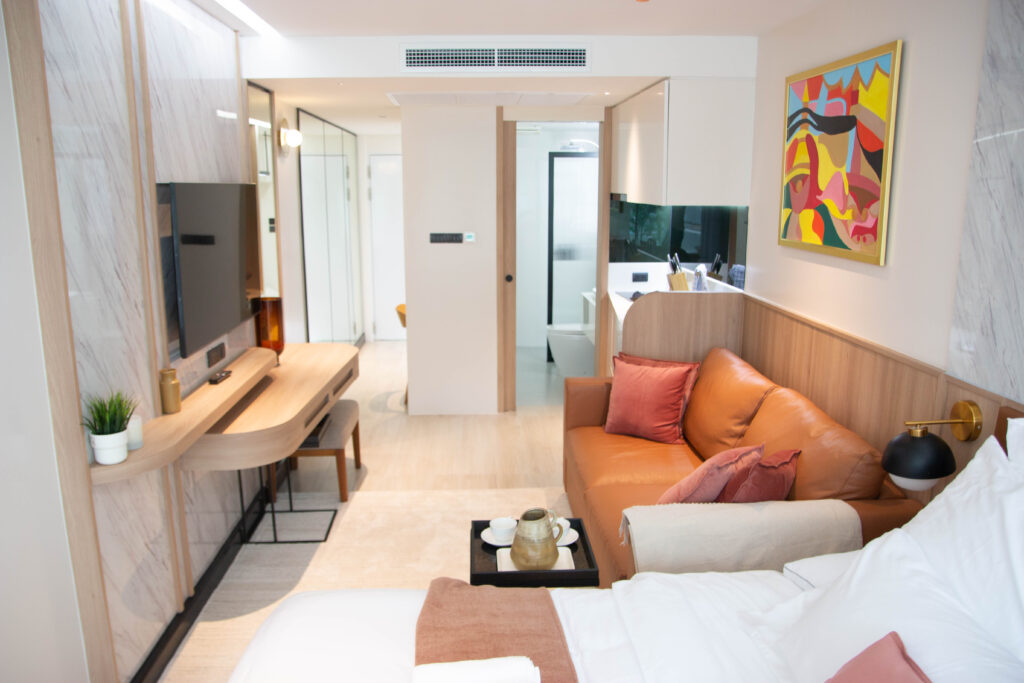The global investment landscape is a constant search for the next promising frontier—a place where high growth potential meets a manageable entry barrier. In recent years, all signs have pointed to Batumi, the dazzling Black Sea pearl of Georgia, as a standout candidate. This article offers an objective, in-depth look at whether this market lives up to the hype and is truly the smartest place for Hotel Room Investments right now.
With a vibrant mix of modern skyscrapers, a historic old town, and a sub-tropical climate, Batumi has transitioned rapidly from a quiet seaside resort into a dynamic international hub. But its visual transformation is only part of the story; the real attraction lies in the compelling economics for those considering Hotel Room Investments.
Understanding Batumi’s Economic Foundation
Any sound investment begins with a look at the underlying economy. Georgia, and the Adjara region where Batumi is located, has consistently demonstrated a pro-business and pro-investment environment.
1. The Pro-Investment Climate
Georgia’s government has actively courted foreign capital with policies designed for simplicity and transparency. For real estate investors, the administrative process is notably streamlined, and foreign citizens generally enjoy the same property rights as locals.
- Low Taxation: The tax regime is highly favorable. There is typically no capital gains tax if a property is held for more than two years, and the annual property tax is remarkably low, often less than 1% of the property value. This fiscal generosity is a major advantage when calculating the net returns from your Hotel Room Investments.
- Visa Freedom: Georgia offers visa-free travel for up to a full year for citizens of nearly 100 countries. This policy not only fuels the tourist market but also attracts digital nomads and long-term expatriates, providing a year-round base for rental demand that stabilizes the market beyond just the summer high season.
2. The Tourism Boom: A Supply-Demand Imbalance
The most critical factor driving the value of Hotel Room Investments is the rapid, sustained growth of tourism. Batumi has been experiencing a massive influx of visitors, particularly from the Middle East, Eastern Europe, and Central Asia.
- Growing Visitor Numbers: The number of international visitors to Georgia has surged in the last decade, with Batumi capturing a significant portion of this growth. The expansion of Batumi International Airport and the continuous development of the port infrastructure solidify its status as a major regional gateway.
- The Luxury Gap: While development is rampant, market data from hospitality analysts like STR Global suggests that Batumi, despite the construction boom, still has a relative deficiency of beds in internationally branded, 5-star hotels compared to similar global cities. This imbalance points to a high-demand, undersupplied segment, which is precisely where high-value Hotel Room Investments are found. This gap is what attracts major international chains like Wyndham, Radisson, Hilton, and Marriott, whose presence acts as a powerful quality assurance and demand driver for investors.
The Investment Structure: Deeded Equity and Passive Income
The Batumi market is largely built around the “aparthotel” or branded residence model. This is key for international buyers seeking a passive income stream without the hassles of self-management.
The Mechanism of Hotel Room Investments
When you invest in an aparthotel, you typically purchase a fully furnished, titled property—a specific unit with a registered deed—that is then placed into a professional rental pool managed by an experienced, often international, hotel operator.
- True Ownership (Deeded Equity): Unlike a timeshare, you own a fractional or entire physical asset, which means you benefit from both rental income and any long-term capital appreciation of the property itself.
- Revenue Sharing Model: Most quality Batumi projects use a transparent revenue-sharing model. Your return is based on the performance of the entire hotel’s rental revenue pool, not just the occupancy of your specific unit. This significantly mitigates the risk of having your unit sit vacant while others are booked.
- Hassle-Free Management: The hotel operator handles everything: marketing, bookings, guest services, housekeeping, maintenance, and utility bills. For an investor located thousands of miles away, this turnkey solution is invaluable, transforming a complex asset into a truly passive source of income. This professional management ensures that the standard of the hotel is maintained, which in turn secures the value of the underlying Hotel Room Investments.
Evaluating Returns: Promises vs. Reality
The high projected returns often advertised in emerging markets require careful scrutiny. In Batumi, the returns for Hotel Room Investments are indeed competitive, but investors must look beyond marketing claims.
The Numbers That Matter
Financial modeling for Batumi’s branded hotel sector typically focuses on two key performance indicators:
- Average Daily Rate (ADR): The average price a room is booked for.
- Occupancy Rate: The percentage of time the room is booked.
In the premium, internationally branded segment, figures recorded by independent bodies like STR Global show an occupancy rate around the 65% to 70% mark for branded hotels, with significantly higher ADRs than independent apartments. This performance drives estimated net rental yields that often range from 8% to 12% annually for well-managed, branded Hotel Room Investments—a figure that comfortably outperforms average yields in established European cities like Lisbon, Nice, or Marbella.
The Advantage of Lower Entry Costs
One of the most persuasive financial arguments for Batumi is the lower entry cost. You can purchase a luxury, fully serviced Hotel Room Investment in Batumi for a fraction of the price of an equivalent asset in a Western European capital or resort city. This means:
- Higher Yield on Cost: Since the purchase price is lower, the annual income translates to a much higher percentage return on the initial investment.
- Portfolio Diversification: The low entry barrier makes it easier for investors to spread their capital across multiple units or even multiple markets, reducing portfolio risk.
Key Risk Factors to Consider
No emerging market comes without risk, and Batumi is no exception. A prudent advisory approach requires a full disclosure of potential challenges.
1. Market Oversupply and Saturation
The rapid pace of construction in Batumi, particularly along the New Boulevard, leads to a genuine concern about market oversaturation. The sheer volume of new units could potentially outstrip tourism growth, which would push down both occupancy rates and rental prices.
Advisory Takeaway: Investors must be selective. Focus on branded Hotel Room Investments managed by reputable international chains. These properties command a premium, benefit from global marketing and loyalty programs, and are less susceptible to the price wars that plague the independent apartment rental market. The quality and name recognition of the operator is the most important defense against oversupply.
2. Dependency on Regional Geopolitics
Georgia’s geographical position means its economy and tourism sector are sensitive to regional geopolitical developments. While Georgia has demonstrated resilience, the investor must acknowledge this external risk factor.
Advisory Takeaway: This risk is largely unmanageable but requires an awareness of portfolio weighting. For truly long-term Hotel Room Investments, the political stability and Western-leaning trajectory of Georgia provide a strong counter-balance to regional volatility.
3. Legal and Regulatory Due Diligence
While the process of buying property is simple, the market is young and still developing its regulatory framework. Investors may encounter less standardization than they are accustomed to in more mature markets.
Advisory Takeaway: Never invest without independent, local legal counsel. Ensure your lawyer reviews every detail of the purchase contract and, most importantly, the Hotel Room Investment rental pool management agreement. Clarity on maintenance costs, management fees, and exit clauses is essential. Transparency in a revenue-sharing model is paramount.
The Verdict: Is Batumi the Hottest Market?
Batumi is undeniably one of the most compelling emerging markets for Hotel Room Investments today. It combines a massive, sustained tourism boom with an investor-friendly government and an attractive price point.
The question isn’t whether Batumi is “hot,” but whether it is smart.
It is smart for an investor who:
- Seeks a truly passive income stream via a hands-off, professionally managed aparthotel structure.
- Wants to achieve higher rental yields (8%–12%) than are possible in most stable Western European markets.
- Prioritizes deeded real estate equity that benefits from both rental income and capital appreciation.
- Understands the importance of international branding as a shield against market volatility.
Batumi’s advantage lies in its unique fusion of low entry costs and high-quality, branded development. It offers a genuine window of opportunity where the market fundamentals—tourism growth, favorable taxes, and a gap in luxury supply—align to produce superior returns on Hotel Room Investments.
In conclusion, Batumi is not just a speculative venture; it is an economically rational investment. The time to enter an emerging market is before it becomes fully saturated and after the international brands have validated its potential. Batumi is squarely in that sweet spot. An informed, diligent investor who partners with reputable international brands can expect this market to deliver on its promise as a top-tier destination for strategic Hotel Room Investments.
Moses Oyong is a luxury real estate advisor with a passion for arts and culture, music, fashion, and all things luxurious. With a keen eye for beauty and attention to detail. I strive to help my clients find their dream homes that reflect their unique sense of style and taste whilst providing them with the right information to ease the stress of the decision-making process.




